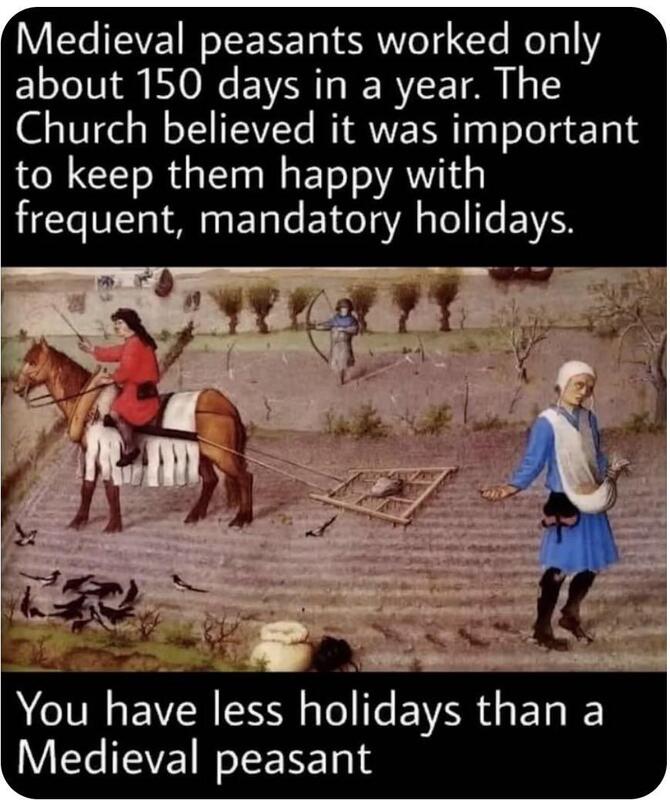This doesn't account for the work they had to do at home. They had their own food to harvest, animals to tend to, clothes to make and the materials to make those clothes didn't fall out of the sky. They had to chop firewood, mend the home, cook the food from scratch. Their mandatory holidays weren't spent pursuing a hobby, traveling, playing games or consuming entertainment. Those days off just meant they could do all the work they needed to do at home instead of doing all the church's work on top of their own.
Antiwork
Date Created: June 21, 2023
This community supports labor, with an aspiration for it to cease to be required to live our lives. Members of this community want to end work, are curious about ending work, want to get the most out of a work-free life, want more information on anti-work ideas and/or want personal help with their own jobs/work-related struggles.
Anti-Work Library 📚
Essential Reads
Start here! Some of the more talked-about essays on the topic.
- The Abolition of Work by Bob Black (1985) | listen
- On the Phenomenon of Bullshit Jobs by David Graeber (2013) | listen
- In Praise of Idleness by Bertrand Russell (1932) | listen

c/Antiwork Rules
Tap or click to expand
1. Server Main Rules
The main rules of the server will be enforced stringently. https://lemmy.world/
2. No spam or reposts + limit off topic comments
Spamming posts will be removed. Reposts will be removed with the exception of a repost becoming the main hub for discussion on that topic.
Off topic comments that do not pertain to the post at hand may be removed if it is deemed they contribute nothing and/or foster hostility at users. This mostly applies to political and religious debate, but can be applied to other things at the mod’s discretion.
3. Post must have Antiwork/ Work Reform explicitly involved
Post must have Antiwork/Work Reform explicitly involved in some capacity. This can be talking about antiwork, work reform, laws, and ext.
4. Educate don’t attack
No mocking, demeaning, flamebaiting, purposeful antagonizing, trolling, hateful language, false accusation or allegation, or backseat moderating is allowed. Don’t resort to ad hominem attacks against another user or insult other people, examples of violations would be going after the person rather than the stance they take.
If we feel the comment is uncalled for we will remove it. Stay civil and there won’t be problems.
5. No Advertising
Under no circumstance are you allowed to promote or advertise any product or service
6. No factually misleading information
Content that makes claims or implications that can be proven false or misleading will be removed.
7. Headlines
If the title of the post isn’t an original title of the article then the first thing in the body of the post should be an original title written in this format “Original title: {title here}”.
8. Staff Discretion
Staff can take disciplinary action on offenses not listed in the rules when a community member's actions or general conduct creates a negative experience for another player and/or the community.
It is impossible to list every example or variation of the rules. It is also impossible to word everything perfectly. Players are expected to understand the intent of the rules and not attempt to "toe the line" or use loopholes to get around the intent of the rule.
9. No posting links to Twitter/X or Meta owned properties
Social Media products such as Twitter/X and Meta Properties (e.g. Facebook, Instagram, Threads) are known low quality information sources - they actively spread misinformation without sufficient moderation, hate speech. These platforms each have billionaire owners working actively to eliminate labor protections through direct action, lobbying, performative large scale layoffs and attacks on institutions that enforce labor law.
You are not encouraged to do so, but you may post screenshots from these sites IF THE INFORMATION IS NOT AVAILABLE ON ANOTHER VALID PLATFORM. Screenshots must include info to support a relevant conversation within this community and must show a VISIBLE time/date stamp for posterity. If you are caught manipulating content of a screenshot, your post will be removed and you will receive an indefinite ban from this community at the discretion of the moderator(s)
No pass through/archive services are allowed as they potentially feed traffic back to these services, directly or indirectly (e.g. Services like Xcancel or Nitter)
Antiwork Suggested Communities
Server status for big servers http://lemmy-status.org/
Active stats from all Antiwork instances
Another way to phrase it:
As our personal workloads were reduced, that free time was commandeered by our employers
Our personal workloads reduced because the industrialisation of agriculture meant we didn't have to grow our own food any more.
Not trying to defend capitalism, but it's disingenuous of you to imply that you don't get anything in return for working.
Either I wasn't clear or you misinterpreted but that's not what I'm implying. Productivity went way up and instead of reduced working hours, we worked MORE and saw proportionally less of the profit.
that's all well and good until the price of necessities is just raised to the point where you need to work as much as a medieval peasant anyways, and don't even get the fresh air they did.
and uh, in many places that happened quite a while ago, the USA is at a point where elderly people need two jobs to afford to live.
Peasants' work was dominantly agricultural, with some required contribution to maintenance of lands and structures around their manor.
Each peasant worked either a family lot, or an open field directly managed by the manor.
They may have worked at home for mending clothes and other simple tasks, but very little was a private responsibility.
Days not committed to work could be spent for games and festivals. There were no private hobbies, but public life was quite rich.
They worked for their Lord, and in return could live there and be subsistence farmers. And the late middle ages had taxes on everything.
Want to mill your wheat? Use the lords mill. Bake bread? Lords ovens. Also pay your tithe, and more taxes due to the war of course.
Enjoy your holiday, but you'll still have to work your own field, milk the goats, gather firewood (no cutting trees from the lords forest though), fetch and boil water, mend the roof, put food away for winter, etc etc. But enjoy only working for rent every other day.
I feel doubtful that the scenario involves taxes as you describe them.
Under a manor, polity and production are fully integrated. Each peasant takes a share the harvest, and may have entitlements for the commons, while the rest falls under control of the lord and his house.
The holidays were also just to placate them so they didn't rise up against their overlords.
Netflix works just as well.
Also social media.
No one actually uses it, though.
Where are you getting your information?
I'm more interested in why you think no one uses social media. I mean, you're using it right now.
Everyone is talking about this like it didn't vary from century to century, or country to country.
The stat refers specifically to England in the 14th century and only covers work done for the landlord (mostly field work, which was hard labour, sometimes extremely long hours).
What work would you understand as not being for the landlord, and what is your source describing the balance of work versus rest throughout the day?
Did the fourteen century mark a great change from the thirteenth, or were conditions largely the same throughout the general era?
Did the fourteen century mark a great change from the thirteenth, or were conditions largely the same throughout the general era?
Massively different. The 14th century saw the death of over half the population by Plague, and then another 20%. That meant a HUGE labour shortage, higher wages by a large amount and "unhappy" landowners and the immediate end of the 100 year war with France. It also hugely increased mobility for peasants, since the receiving nobility would happily accept them (despite technically being allowed to).
It resulted in the Peasants revolt in the 1380s which saw the tower of London sacked before it was suppressed. So landowners had a lot of reasons to keep the peasants at least moderately happy.
So the late 14th century Britain was basically a worker paradise compared to the rest of the middle ages. But only because a good 75% of the population died from disease and famine in the decades before.
The context, though, is bonded field labor, not waged urban labor.
@unfreeradical sorry, I can't cite any sources. I read around this subject the first time I saw this meme, because I was curious as the people who are usually cited as doing less total work than us are hunter-gatherers.
Here are a couple of pages about types of peasant, work, etc.
If you're saying this because you disagree and have sources of your own to recommend, please do as I'm always open to learning more.
Jokes on you, I’m underemployed.
Fewer. Fewer holidays. Mad about it all the same.
This made me think of Historia Civilis' video about work.
You say holidays but I am imagining prayer and activities that keep the church in power :/
What did they do the rest of the time?
Play games. Sing and dance.
Imbibe.
Ogle the strapping lads and buxom maidens.
Take care of gramps, while listening to stories about the good old days, when the soil was so soft the fields virtually plowed themselves, lords properly honored the labor of their surfs, and knights actually helped their ladies mount a horse, and could even buy a whole suit of armor for less than five times their annual earnings.
What would you do?
Mostly work at home.
Most peasants didn't own the fields they were working to feed their own household. Instead, they leased them from the local lord, who owned most of the land.
(This seems to be the core difference between "peasants" and " freemen" - the latter owned their own land.)
I'm exchange, they were called in to work the lord's fields as well as their leased "home plot".
As far as I know, this statistic only refers to the "holidays" where the lord was not allowed to call in their land-tenants to work. They still had to work to maintain their own household as needed.
This doesn't mean that people had to work on the lord's fields all day on all non-holidays, it was just an upper limit. The exact amount was probably codified in local laws / the lease agreement.
It also doesn't mean that people had to work all the time even on holidays - just enough to get their shit done. Some days were even explicit "no work at all" holidays or half-days, were peeps where expected to show up at church instead.
And the amount of work needed generally varied wildly with the seasons - harvest season was crunch time, winter was slow season. It also varied depending on the exact location (agriculture in the Mediterranean was different than in Scotland) and on the available technology.
